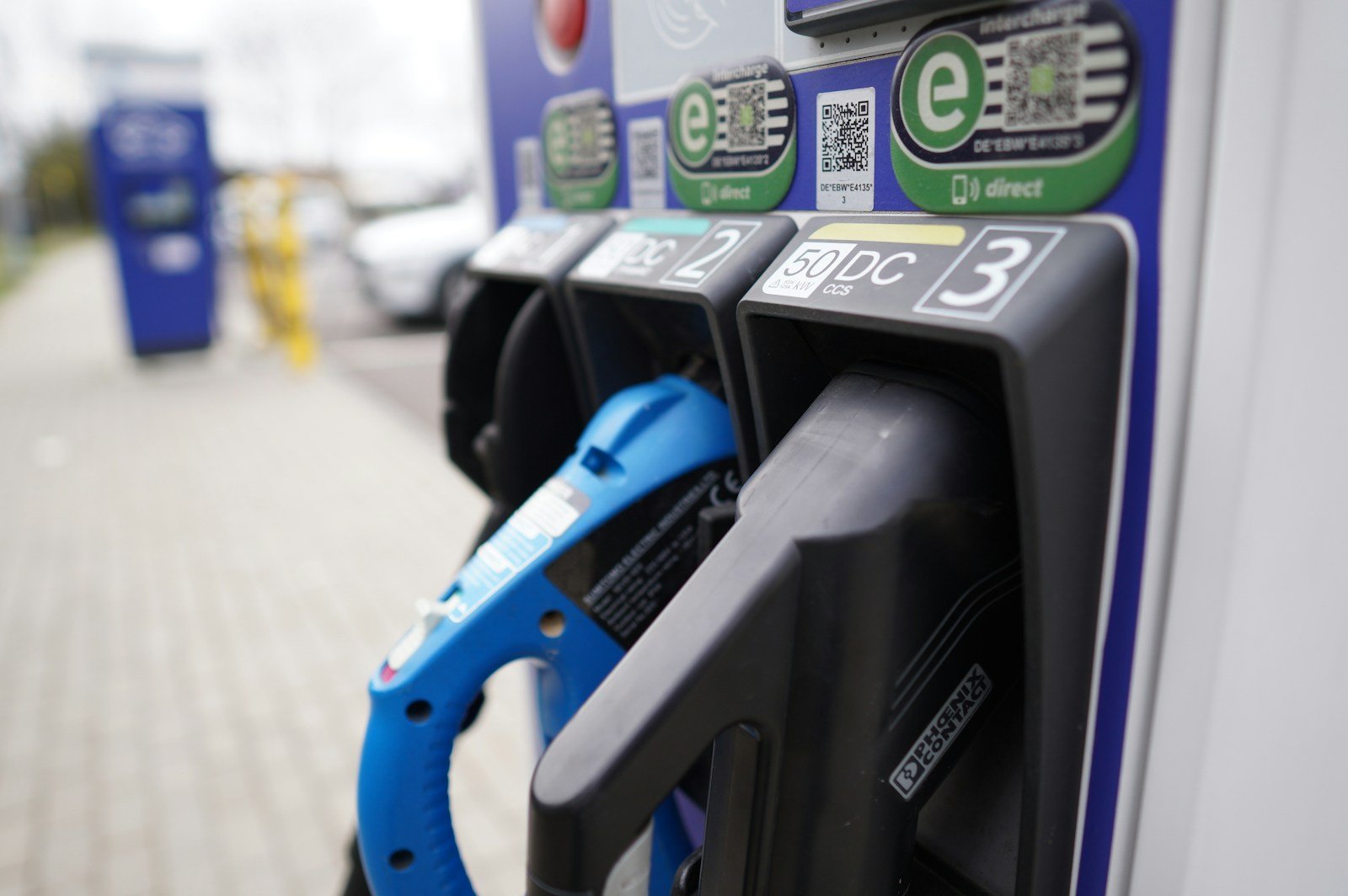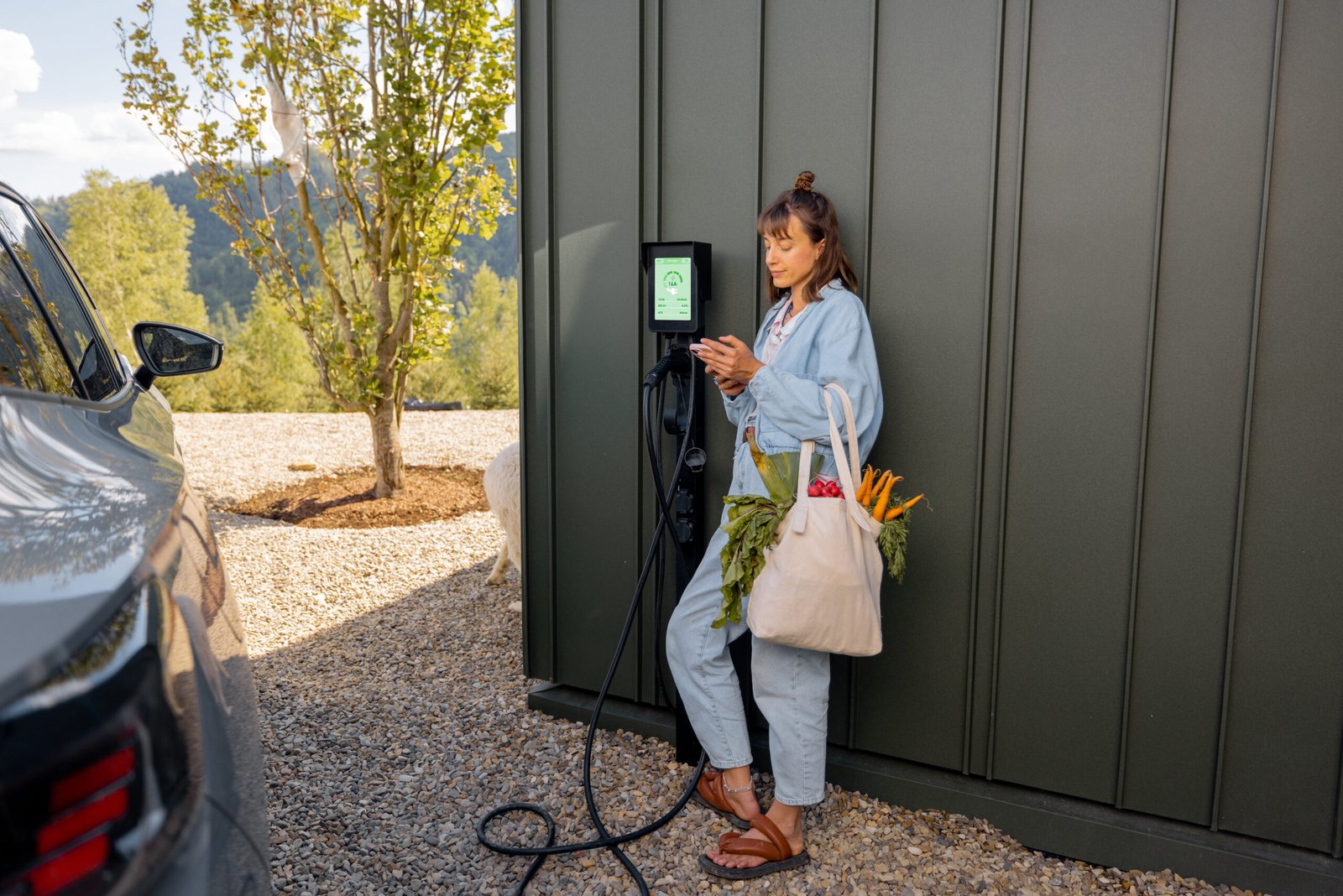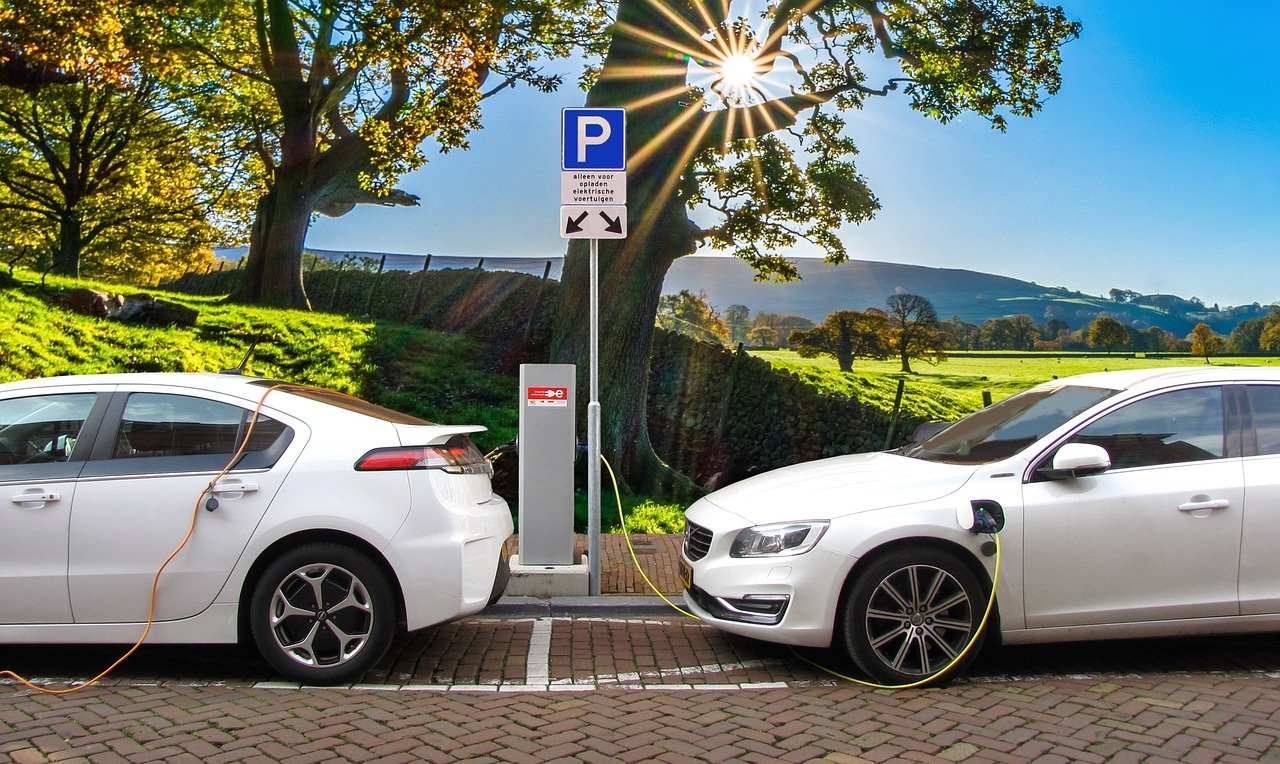Is it a good idea?
Absolutely, without a doubt! Especially if EV charger installation at homes means never having to worry about locating a public charging station again and being able to start your day with a fully charged vehicle.
Thanks to the Canadian government’s $14.9 million investment in EV infrastructure, now is the ideal time to transition to a more economical and environmentally friendly home charging option. Homeowners may further reduce their expenditures by taking advantage of schemes like Calgary’s, which give up to $4,000 for charger installations in multi-residential complexes.
By charging your EV at home, you will help keep the environment cleaner and greener and save money on gas. We at Green Plug are thrilled to be a part of this eco-friendly movement by bringing low-cost and efficient EV charging options to households across Canada.
Learn how this purchase will improve your life in addition to your vehicle.
What’s the cost to install a home EV charger in Canada?
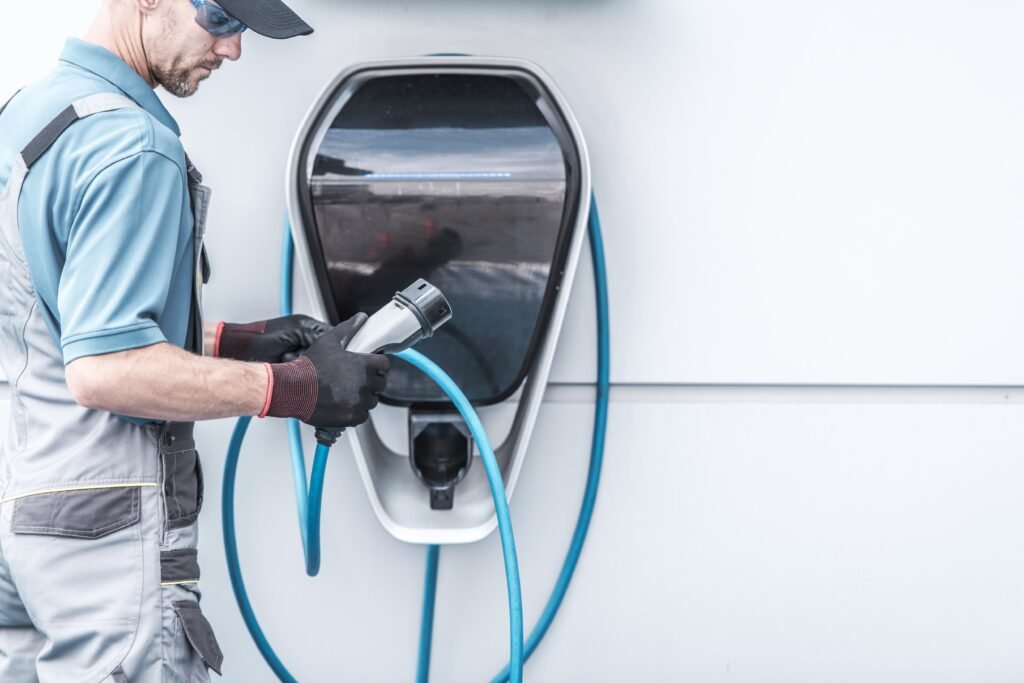
The total cost of installing an EV charger at home in Canada can be affected by several factors. On average, costs can vary from $500 to $4,500, with the exact amount depending on factors including charger type and installation difficulty. Level 2 chargers are better, but they’re more expensive. This is particularly true if your home’s electrical infrastructure needs to be upgraded to endure the additional power. Also, local labor rates and the cost of any required permissions might affect the final installation price.
Which aspects of the installation’s budget are most important to consider?

In Canada, there are a number of variables that could impact the final price tag when planning to install an EV charger at home. The price usually falls between $500 and $4,500, but let’s take a closer look at the factors that affect these costs:
- Type of Charger: Level 1 and Level 2 are the two most popular types of home chargers. Although they charge cars more slowly, level 1 chargers are cheaper. Although they are more expensive, level 2 chargers are quicker and more efficient.
- Installation Difficulty: The price tag can go up if you have to upgrade your electrical system to accommodate a Level 2 charger. This may necessitate rewiring the installation site or upgrading your electrical panel.
- Labor Costs: It is vital to use a trained electrician to ensure a safe and compatible installation. The intricacy of the installation and your location might affect the labor expenses.
- Inspections and permissions: The total cost can go up if you need to get inspections or get permissions, which depend on the rules in your area. Installing home EV chargers may be a great way to save money, thanks to incentives and rebates offered by several jurisdictions. Looking into what’s local is a good idea.
- Enhanced Capabilities: Some chargers provide enhanced capabilities, such as Wi-Fi connectivity or energy monitoring, which might elevate their price tag but bring about greater efficiency and simplicity of use.
If you consider these facts, you can get a better idea of how much it will cost and make an informed decision that meets your needs and budget.
Exploring the Range of EV Charger Options
Canada’s electric vehicle (EV) charger market is rapidly evolving, offering a diverse array of options tailored to meet the dynamic needs of EV owners. Whether you’re a homeowner looking for a convenient charging solution or a business aiming to attract eco-conscious customers, understanding the available charger types is crucial.
In Canada, there are primarily three types of EV chargers used for both residential and commercial purposes:
- Level 1 Chargers: These are the most basic chargers, using a standard 120-volt outlet. They are typically used for residential charging due to their slower charging speed, which adds about 8 kilometers of range per hour.
- Level 2 Chargers: These chargers operate on a 240-volt circuit and are common in both residential and commercial settings. They offer faster charging speeds, adding 30 to 60 kilometers of range per hour, making them ideal for home use and workplaces.
- DC Fast Chargers: These are primarily used in commercial settings, such as public charging stations. They provide rapid charging, capable of charging an EV to 80% in about 30 minutes, making them suitable for long-distance travel and high-traffic areas.
Each type serves different needs, from basic home charging to fast, on-the-go solutions.
Level 1 chargers plug into regular 120-volt outlets and are the most basic chargers that come with your EV. They are ideal for overnight charging because they do not require installation but have the slowest charging speed.
For a more rapid charging experience, utilize a Level 2 charger, which requires a 240-volt outlet like those used for big appliances. The usual range for these chargers is $500 to CAD 1,000. They are perfect for homeowners who want their devices to charge faster.
Like the Tesla Wall Connector, a hardwired charger provides rapid charging by connecting to the house’s electrical wiring. Those with dedicated parking places may afford them, although they are more expensive owing to their enhanced capabilities.
The differences in installation requirements, cost, and charging speed between the types have an impact on the homeowner’s convenience and total expenditure.
Which Brand Should You Choose for the Perfect Charger?
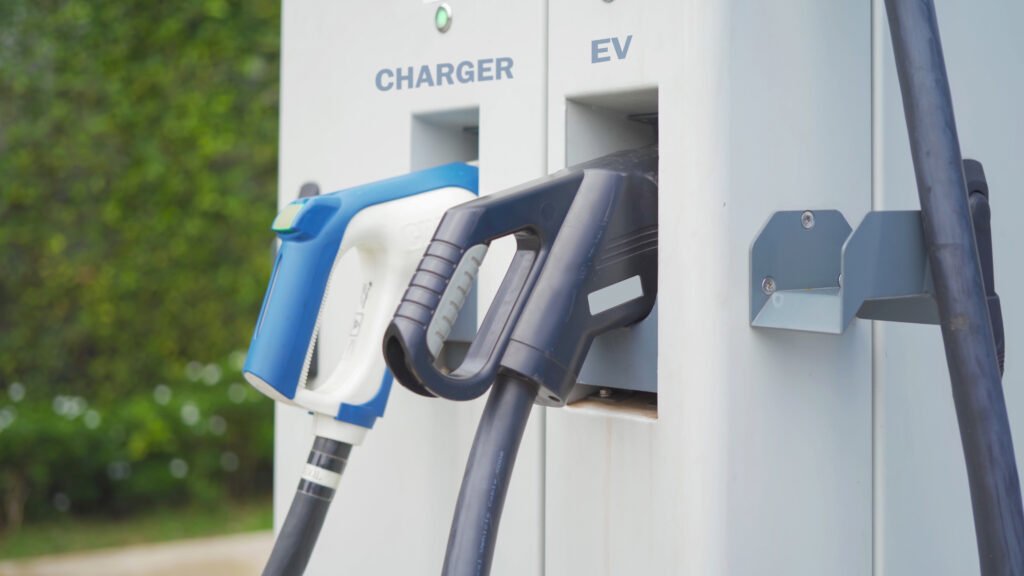
Choosing the right EV charger brand is crucial to ensuring you get the most out of your electric vehicle experience. Let’s shake things up and explore some of the standout players in the Canadian market:
- Tesla: Renowned for revolutionizing the EV landscape, Tesla’s Wall Connector is a symbol of efficiency and style. This powerhouse delivers up to 44 miles of range per hour, setting a new benchmark for charging speed. With its sleek design and seamless integration into the Tesla ecosystem, it offers smart features that allow you to schedule and monitor charging through the Tesla app, making it a top pick for tech-savvy EV enthusiasts.
- FLO: Hailing from Canada, FLO brings durability and reliability to the forefront. Their chargers, perfect for both residential and commercial use, are built to withstand Canada’s diverse climate. FLO’s commitment to quality ensures that whether you’re at home or on the go, you have a dependable source of power.
- Grizzl-E: Think rugged and robust, and you’ll land on Grizzl-E. This Canadian brand is crafted to endure the harshest conditions. The Grizzl-E Ultimate 48A stands out with its exceptional power and adaptability, making it an excellent choice for those who demand both performance and resilience.
- Enel X: Known for pushing the boundaries of innovation, Enel X’s JuiceBox chargers are a game changer. They offer not just charging but a smart experience with features that optimize energy usage and cut down costs, making them ideal for eco-conscious homeowners looking to maximize efficiency.
- SWTCH Energy: If flexibility is what you need, SWTCH Energy is your go-to. Their solutions cater to multi-unit residences and workplaces, providing smart energy management and easy scalability. Whether it’s a single-family home or a bustling office, SWTCH ensures that your charging needs are met with ease and sophistication.
Each of these brands brings something unique to the table, ensuring that no matter your preference, there’s an option tailored just for you.
Can You Plug in an EV at Home?
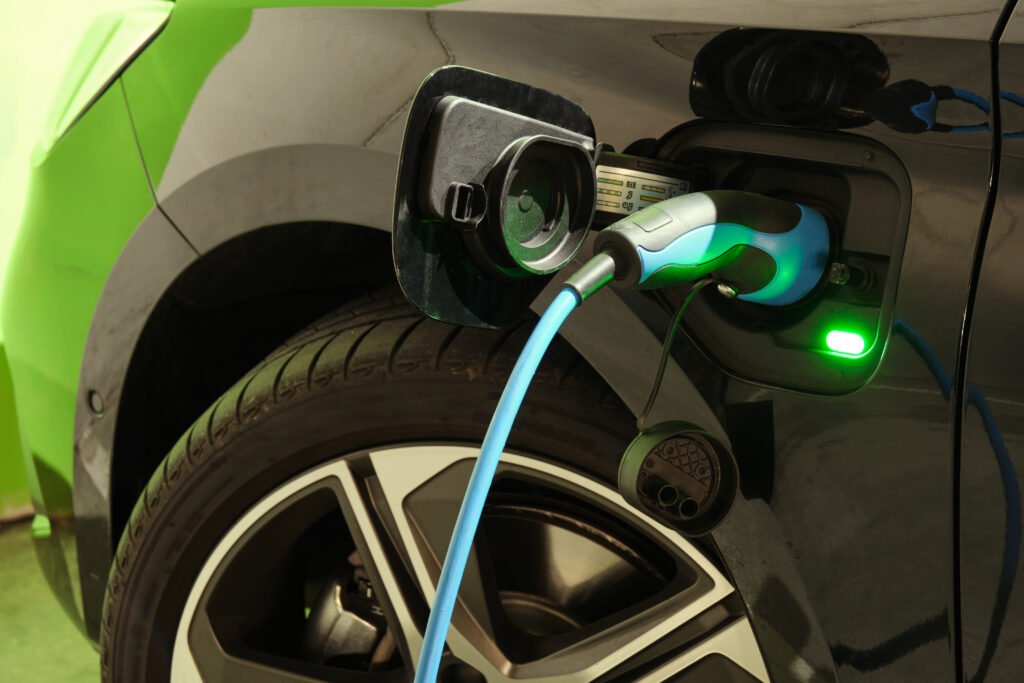
Find out if your electrical panel can manage the extra power demand before you install a home charging station for EVs. To guarantee safe and effective functioning, it is important to replace older panels because they may not be able to withstand the load of an EV charger.
Although it’s an extra expense, this improvement is essential for avoiding electrical problems and should be considered when planning your budget for a home charger. If you prepare ahead, you can easily upgrade your home’s electrical capacity to allow EV charging.
Be careful about choosing your electrician for EV installation because one simple mistake can cost a huge loss!
Financial Safety Nets: Government Rebates and Incentives

Installing an EV charger can seem like a huge financial burden, but Canadian drivers have access to a wide range of discounts and incentives. Financing options for home EV charger installation include:
- Zero-Emission Vehicle Infrastructure Program (ZEVIP):
The Zero-Emission Vehicle Infrastructure Program (ZEVIP) is a pivotal federal initiative aimed at enhancing the electric vehicle charging infrastructure throughout Canada. It provides substantial financial assistance to alleviate installation expenses, thereby encouraging the widespread adoption of electric vehicles. This program is instrumental in supporting the country’s transition to sustainable energy solutions by ensuring comprehensive charging accessibility nationwide. - CleanBC Go Electric Program (British Columbia):
The CleanBC Go Electric Program offers financial incentives to promote the installation of electric vehicle chargers. Single-family homeowners are eligible for up to $350, whereas condominiums and businesses can receive rebates up to $2,000. These incentives are designed to lower financial barriers and advance British Columbia’s commitment to sustainable transportation and environmental preservation. - Quebec Incentives:
Quebec provides robust support for the installation of electric vehicle chargers. Residents may receive up to $600 for Level 2 chargers in homes, and the program covers 50% of installation costs for multi-unit dwellings, with a cap of $5,000 per station. These initiatives reflect Quebec’s dedication to reducing emissions and fostering sustainable energy practices by facilitating the adoption of electric vehicles. - Yukon Incentives:
Incentives in Yukon include coverage of 50% of the costs for residential Level 2 chargers, up to $1,500. For businesses and charitable organizations, up to 75% of the installation costs are covered, with a maximum of $7,500 per charger. These financial supports are designed to encourage the transition to electric vehicles across residential and commercial sectors, enhancing eco-friendly transportation within the territory. - Prince Edward Island Program:
Prince Edward Island offers a $750 incentive for residents to purchase and install Level 2 chargers. This program is aimed at reducing the financial burden associated with the transition to electric vehicles and supporting the island’s strategic environmental objectives by promoting sustainable energy use and decreasing dependency on fossil fuels.
Not only do these subsidies lower the initial cost of installing a home charger, but they also make the switch to an EV more accessible. Adopting these advantages guarantees a less disruptive and costlier transition to environmentally friendly driving.
Charging Towards a Greener Tomorrow- A Commitment to Our Planet and Community

Installing a home EV charger is more than a practical upgrade; it’s a heartfelt commitment to our planet and future generations. As you embrace the ease and affordability of home charging, you’re not just investing in personal convenience but also contributing to a healthier, cleaner world.
Let this choice be a testament to our collective desire to protect the environment and nurture a sustainable community. Together, we can create a ripple effect of positive change, one charge at a time. Let’s embark on this journey with hope and solidarity, knowing that every small step we take today leads to a brighter, greener tomorrow. Join this movement, and let’s make a difference—together.
Seeking an easy-to-reach and reliable EV installer? Green Plug Is Here to Assist!
Green Plug strives to make the transition to electric vehicles as simple and painless as possible for everyone. To make sure you’re comfortable and confident throughout the procedure, our team is committed to providing individual support. Your happiness and the obvious advantages of installing an EV charger in your house are our top priorities.
We take care of all the technicalities so you can enjoy savings and ease, including helping you choose the correct charger or guiding you through the available rebates. Contact Green Plug at your convenience for an informal consultation and no-obligation price quotation. To help you on your way to more environmentally friendly driving, let’s collaborate!
FAQ – EV Charger Installation at Canadian Homes
What is the typical installation process for a home EV charger?
The installation process typically involves assessing your electrical system, selecting a suitable charging station, and professional installation by a certified electrician to ensure safety and compliance with regulations.
How long does it take to install a home EV charger?
Installation can usually be completed within a day, depending on the complexity of the work required. More extensive electrical upgrades may extend the timeline.
How can I ensure my home electrical system can handle an EV charger?
A professional assessment by a certified electrician can determine if your current electrical system can support a home EV charger or if upgrades are necessary.
How much does it cost to charge an electric vehicle at home in Canada?
Charging costs depend on local electricity rates and the capacity of the charger. On average, it can cost between $2 to $5 for a full charge, depending on the vehicle’s battery size.
Can I install a home EV charger myself, or do I need a professional?
It’s recommended to hire a certified electrician for installation to ensure safety, proper setup, and compliance with local electrical codes.
What maintenance is required for home EV chargers in Canada?
Routine maintenance for home EV chargers is minimal and typically involves regular visual inspections and occasional cleaning to ensure optimal performance.
How can installing a home EV charger increase the value of my property?
Installing a home EV charger can potentially increase the value of your property by appealing to eco-conscious buyers who own or plan to own an electric vehicle. As the demand for EVs grows, homes equipped with charging facilities become more attractive, offering convenience and future-proofing for prospective buyers. Additionally, having a charger at home can be seen as a modern amenity, similar to having advanced home automation systems.
What are the technical requirements for installing a home EV charger in Canada?
The technical requirements for installing a home EV charger in Canada include:
Electrical Capacity: Your home must have sufficient electrical capacity to support the additional load of an EV charger. This might involve upgrading your electrical panel.
Voltage and Amperage: Most Level 2 chargers require a 240-volt outlet and a dedicated 30- to 50-amp circuit.
Location: Choose a location that allows easy access to your vehicle while minimizing the distance from the electrical panel to reduce installation costs.
Compliance: The installation must comply with the Canadian Electrical Code and any local building codes, which a licensed electrician can ensure.
How does installing a home EV charger impact my electricity bill?
Installing a home EV charger increases your electricity bill by adding the consumption needed to charge your vehicle. The impact depends on how often and how long you charge your EV. Charging during off-peak hours, when electricity rates are lower, can help reduce costs. Time-of-use plans offered by some utilities allow you to take advantage of cheaper rates. While the bill may rise, the cost of electricity is usually less than gasoline, leading to potential savings over time. Using a smart charger can further optimize energy use and manage expenses effectively.

